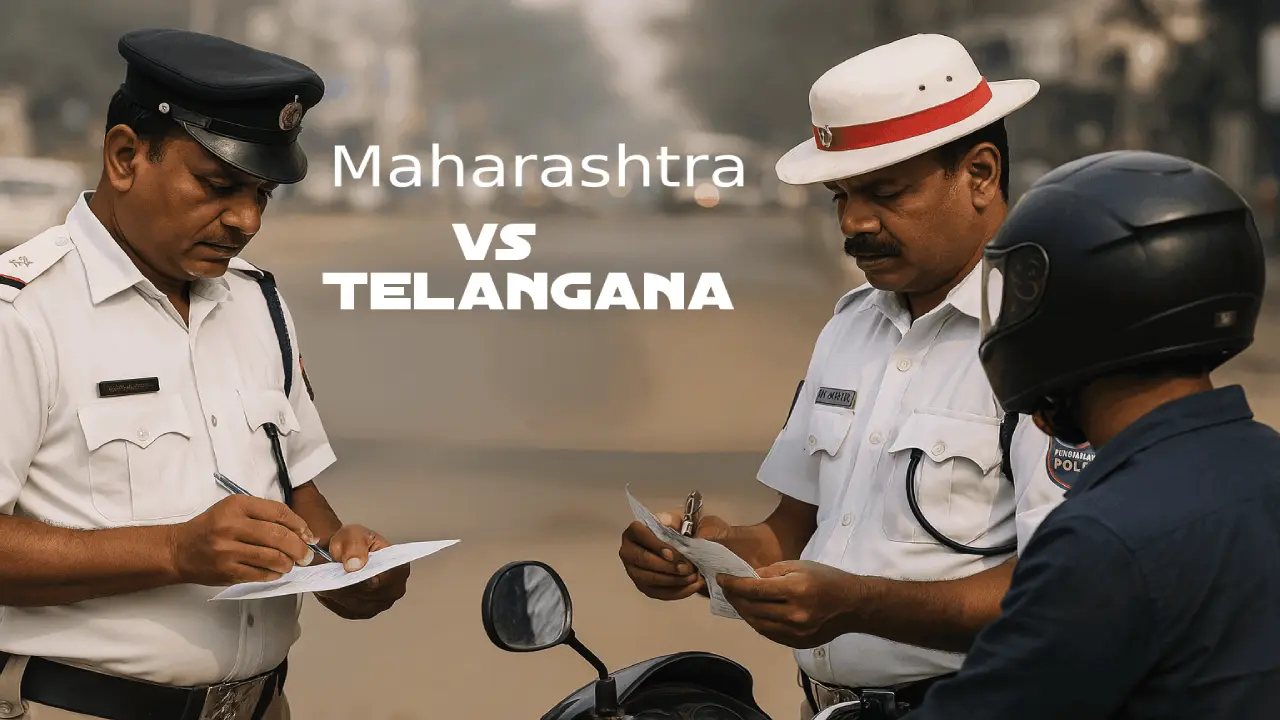

Discover the distinct world of challan penalties in Maharashtra and Telangana. Exploring the differences between these states' traffic violations and penalties reveals unique approaches to enforcing road regulations.
Maharashtra's penalties, governed by the Motor Vehicles Act 1988, range from moderate to hefty, with a focus on stringent enforcement and e-challans. In Telangana, the Telangana Motor Vehicles Act of 1989 dictates similar penalties, but variations may exist in amounts and enforcement methods.
In this article, we will explore the differences between challan penalties in Maharashtra and Telangana, shedding light on the key aspects you need to know.
Maharashtra: Traffic offences are classified into different categories based on their severity, including minor offences, medium offences, and major offences. This categorisation helps determine the appropriate penalties for each violation.
Telangana: Traffic offences qualify as compoundable offences and non-compoundable offences. Compoundable offences can be resolved by paying a fine, while non-compoundable offences may require legal proceedings.
For example, not wearing a helmet or jumping a traffic signal in the state can attract fines ranging from Rs. 500 to Rs. 1,500, while overspeeding can result in fines ranging from Rs. 1,000 to Rs. 2,000.
For instance, not wearing a helmet incurs a fine of Rs. 135, jumping a traffic signal results in a fine of Rs. 200, and overspeeding leads to a fine of Rs. 1,000.
Using a mobile phone while driving is considered a traffic offence in both Maharashtra and Telangana.
Maharashtra: The fine for this violation ranges from Rs. 500 to Rs. 1,500.
Telangana: The fine amount for using a mobile phone while driving can range from Rs. 500 to Rs. 1,000.
Driving under the influence of alcohol is strictly penalised in both Maharashtra and Telangana.
Maharashtra: The fine for drunk driving can range from Rs. 2,000 to Rs. 10,000, depending on the severity of the offence.
Telangana: The penalty for drunk driving is a fixed fine of Rs. 10,000.
Maharashtra: Repeating traffic offences within three years can result in higher fines and stricter penalties. This emphasises the importance of complying with traffic rules and avoiding repeated violations.
Telangana: Repeat offences within three years may lead to higher fines and possible suspension of the driving license. The aim is to discourage individuals from committing the same violations repeatedly and ensure road safety.
These specific details highlight the differences in traffic violation penalties between Maharashtra and Telangana, offering a clearer understanding of the consequences drivers may face in each state. Being aware of the differences in challan penalties between Maharashtra and Telangana is crucial for responsible driving.
Remember to always adhere to traffic rules and regulations to ensure your safety and the safety of others on the road. It is advisable to stay updated with the latest guidelines and amendments introduced by the respective state transport departments.
Understanding the difference between challan penalties in Maharashtra and Telangana is essential for motorists to navigate the respective state regulations effectively. While both states have their own unique traffic rules and enforcement systems, the Park+ app offers a convenient solution to stay informed and avoid unnecessary penalties.
To assist with this, the Park+ app offers a convenient solution. Park+ provides a range of services to car owners, including checking challans, FASTag recharge, and used car trading. The app also offers car insurance and provides information on car loans, RTOs, car models, and more. Additionally, Park+ partners with large offices, businesses, malls/hotels, and gated communities to offer parking solutions.
To stay updated on challan information and avail of these services, download the Park+ app. Stay informed, avoid penalties, and experience a hassle-free journey on the roads.